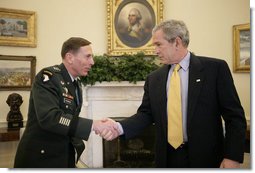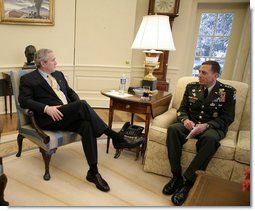
- Afghanistan
- Africa
- Budget Management
- Defense
- Economy
- Education
- Energy
- Environment
- Global Diplomacy
- Health Care
- Homeland Security
- Immigration
- International Trade
- Iraq
- Judicial Nominations
- Middle East
- National Security
- Veterans
|
Home >
News & Policies >
January 2007
|
For Immediate Release
Office of the Press Secretary
January 26, 2007
President Bush Congratulates General Petraeus on Senate Confirmation, Discusses Way Forward in Iraq
The Oval Office
![]() In Focus: Renewal in Iraq
In Focus: Renewal in Iraq
![]() In Focus: Defense
In Focus: Defense
10:20 A.M. EDT
THE PRESIDENT: I just had a full briefing with General David Petraeus about the way forward in Iraq. I want to thank the Secretary, and General Pace, National Security Advisor, for joining this discussion. Congratulations.
GENERAL PETRAEUS: Thank you, sir.
THE PRESIDENT: The Senate confirmed this good man without a dissenting vote. I appreciate the quick action of the United States Senate. I appreciate them giving General David Petraeus a fair hearing, and I appreciate the vote. My instructions to the General is, get over to the zone as quickly as possible and implement a plan that we believe will yield our goals.
 I thank the General and his family. I particularly want to thank your
family for supporting you and supporting our nation. One of the amazing
things about our country is that we've got military folks who volunteer to
go into a tough zone to protect the American people from future harm, and
they've got families who stand by them. Whether you be a general or a
private in the military, there is a U.S. -- there's a family member saying,
I love you and I support you.
I thank the General and his family. I particularly want to thank your
family for supporting you and supporting our nation. One of the amazing
things about our country is that we've got military folks who volunteer to
go into a tough zone to protect the American people from future harm, and
they've got families who stand by them. Whether you be a general or a
private in the military, there is a U.S. -- there's a family member saying,
I love you and I support you.
And so, General, I congratulate you and I congratulate the volunteers and their families for making the hard decisions necessary to protect its people from a grave danger. And you're going into an important battle in this war on terror, and I give you my full support, and wish you Godspeed.
GENERAL PETRAEUS: Thank you, Mr. President. If I could thank the Senate, as well, thank my family, and above all thank those great soldiers, sailors, airmen, Marines and civilians who are out there on the front lines of the global war on terror.
THE PRESIDENT: All right. I'll answer a couple of questions. Jennifer.
Q Thank you, sir. The other night in your State of the Union address, you asked Congress to give your plan a chance. But lawmakers, Democrats and Republicans, didn't really miss a step in starting to turn out resolutions against that plan. Why do you think it's okay to go ahead without their support?
THE PRESIDENT: One of the things I've found in Congress is that most people recognize that failure would be a disaster for the United States. And in that I'm the decision maker, I had to come up with a way forward that precluded disaster. In other words, I had to think about what's likely to work.
And so I worked with our military and I worked with Secretary Gates to come up with a plan that is likely to succeed. And the implementor of that plan is going to be General Petraeus. And my call to the Congress is, is that I know there is skepticism and pessimism, and that they are -- some are condemning a plan before it's even had a chance to work. And they have an obligation and a serious responsibility, therefore, to put up their own plan as to what would work.
I've listened a lot to members of Congress. I've listened carefully to their suggestions. I have picked the plan that I think is most likely to succeed, because I understand, like many in Congress understand, success is very important for the security of the country.
Q This policy of going after the Iranians inside Iraq, are you concerned that that could be a provocative act in the region?
THE PRESIDENT: I made it very clear, as did the Secretary, that our policy is going to be to protect our troops in Iraq. It makes sense that if somebody is trying to harm our troops, or stop us from achieving our goal, or killing innocent citizens in Iraq, that we will stop them. That's an obligation we all have, is to protect our folks and achieve our goal.
Now some are trying to say that because we're enforcing -- helping ourselves in Iraq by stopping outside influence from killing our soldiers or hurting Iraqi people that we want to expand this beyond the borders -- that's a presumption that simply is not accurate. We believe that we can solve our problems with Iran diplomatically, and are working to do that. As a matter of fact, we're making pretty good progress on that front. As you know, the Iranians, for example, think they want to have a nuclear weapon. And we've convinced other nations to join us to send a clear message, through the United Nations, that that's unacceptable behavior.
And so, yes, we're going to continue to protect ourselves in Iraq, and at the same time, work to solve our problems with Iran diplomatically. And I believe we can succeed. The choice is the Iranian government's choice. And one of the things that the Iranian government has done, is they've begun to isolate their nation to the harm of the Iranian people. And the Iranian people are proud people, and they've got a great history and a great tradition.
Our struggle is not with the Iranian people. As a matter of fact, we want them to flourish, and we want their economy to be strong. And we want their mothers to be able to raise their children in a hopeful society. My problem is with a government that takes actions that end up isolating their people and ends up denying the Iranian people their true place in the world. And so we'll work diplomatically, and I believe we can solve our problems peacefully.
Thank you all very much.
END 10:26 A.M. EST



